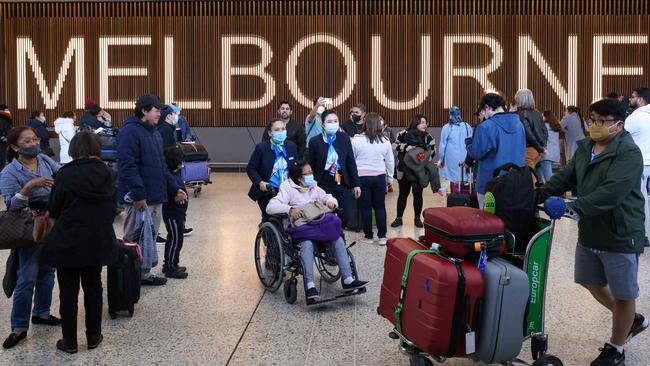No evidence international airfares are falling despite Qantas CEO’s claims
New data shows ticket prices for some key routes are up 65 per cent, contrary to Qantas chief Alan Joyce’s claims airfares have fallen.

Business
Don't miss out on the headlines from Business. Followed categories will be added to My News.
International airfares out of Australia continued to climb in the first eight-months of 2023, despite claims by Qantas chief executive Alan Joyce they had fallen.
Airfare data provided by Webjet across all airlines operating in and out of the country, show on many routes prices have continued to increase, compared to last year and in 2019.
On Melbourne to Los Angeles, travellers are paying 65 per cent more for a return economy fare compared to pre-Covid, and Sydney-Los Angeles is 59 per cent more expensive.
Perth-Denpasar flights have also skyrocketed in price, up from $506 in 2019 to $775 this year, and Brisbane-Singapore is 46 per cent more expensive at $1795 compared to $1230 in 2019, and $1685 last year.
Some of the biggest year-on-year increases were on Perth-Denpasar (up 16 per cent); Melbourne-Singapore (up 14 per cent) and Sydney-London (up 12.8 per cent).
The Webjet data followed comments by Mr Joyce at Qantas’s full year results announcement that “extra flying by Qantas and a strong return by around 50 other airlines serving the market, was already lowering the price of travel”.
“The data shows that economy fares peaked in December of last year, and they’ve fallen since then by about 12 per cent, and they should keep on dropping as more international capacity goes online,” said Mr Joyce last month.
Only a handful of routes were cheaper this year compared to last including Sydney-Denpasar at $1100 return down from $1115 in 2022; Brisbane-San Francisco at $2430 return, compared to $2810 last year, and Adelaide-Kuala Lumpur at $1510 from $1550 in 2022.

The ongoing high price of international fares was of concern to tourism operators, still struggling to recover from two-years of border closures during the pandemic.
Australian Tourism Export Council managing director Peter Shelley said he had written to Transport Minister Catherine King to convey members’ concerns.
The move followed on from her decision to refuse Qatar Airways more flights into Sydney, Melbourne and Brisbane.
Mr Shelley said the number of international holidaymakers arriving into Australia each month, continued to lag well behind pre-Covid-19 levels.
“A key factor impacting recovery is aviation – sustained high airfares coupled with a lack of airline capacity and competition are impeding growth, which in turn affects our tourism trade deficit,” wrote Mr Shelley.
“By allowing more competition into Australia from international airlines, we are opening up the opportunity for job creation, higher export earnings, lower airfares both into and out of Australia, all thanks to an increase in international tourist arrivals.”
Mr Shelley pointed out that there were some “clear winners in this post-Covid period” as airlines posted record profits, but the opposite was true of many other tourism operators.
“Our ability to grow and service inbound visitors who contribute significantly to our export earnings is being curtailed by limited access by international carriers into Australia,” he said.
“While many reports indicate that capacity is close to returning to 2019 levels across all carriers, the data is skewed by a couple of isolated increases: most of our key inbound markets are still somewhere between 50 per cent and 80 per cent of their 2019 capacities.”
His comments came as the Greens announced plans to introduce a Bill into the next sitting of federal parliament, seeking a nightly curfew and cap of 45-flights an hour on Brisbane Airport.
The move was in response to noise complaints from residents of inner Brisbane following the opening of the airport’s second runway in 2020.
Brisbane Airport Corporation head of public affairs Stephen Beckett said such measures would drastically reduce the number of flights operating into the gateway at significant cost to the economy.
“It beggars’ belief, that in the middle of a national debate about Australians accessing affordable air travel that the Greens would want to slash international services as well as thousands of services to regional Queensland,” Mr Beckett said.
“International airfares are currently up to 50 per cent more expensive than before Covid. Australians now understand that extra capacity forces prices down. Wiping out services from Qatar Airways, Emirates, Cathay Pacific, Singapore, Qantas and Virgin which currently depart after 10pm would hit Queenslanders hard.”
Minister King was already under pressure over the decision to deny Qatar Airways more flights into Brisbane, Sydney and Melbourne.
Opposition leader Peter Dutton said there was a “level of murkiness” to the decision, which was previously explained by Ms King as “not being in the national interest”.
Qantas was the only stakeholder known to have objected to the flights on the grounds they would’ve distorted the market at a time when other airlines were still trying to ramp up.
Virgin Australia, which has a partnership with Qatar Airways, has suggested the flights would’ve almost immediately put downward pressure on international airfares.
More Coverage
Originally published as No evidence international airfares are falling despite Qantas CEO’s claims





